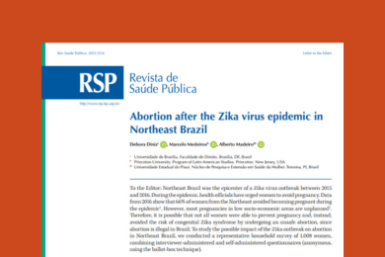
Northeast Brazil was the epicenter of a Zika virus outbreak between 2015 and 2016. During the epidemic, health officials have urged women to avoid pregnancy. Data from 2016 show that 66% of women from the Northeast avoided becoming pregnant during the epidemic1. However, most pregnancies in low socio-economic areas are unplanned2. Therefore, it is possible that not all women were able to prevent pregnancy and, instead, avoided the risk of congenital Zika syndrome by undergoing an unsafe abortion, since abortion is illegal in Brazil. To study the possible impact of the Zika outbreak on abortion in Northeast Brazil, we conducted a representative household survey of 1,008 women, combining interviewer-administered and self-administered questionnaires (anonymous, using the ballot-box technique).